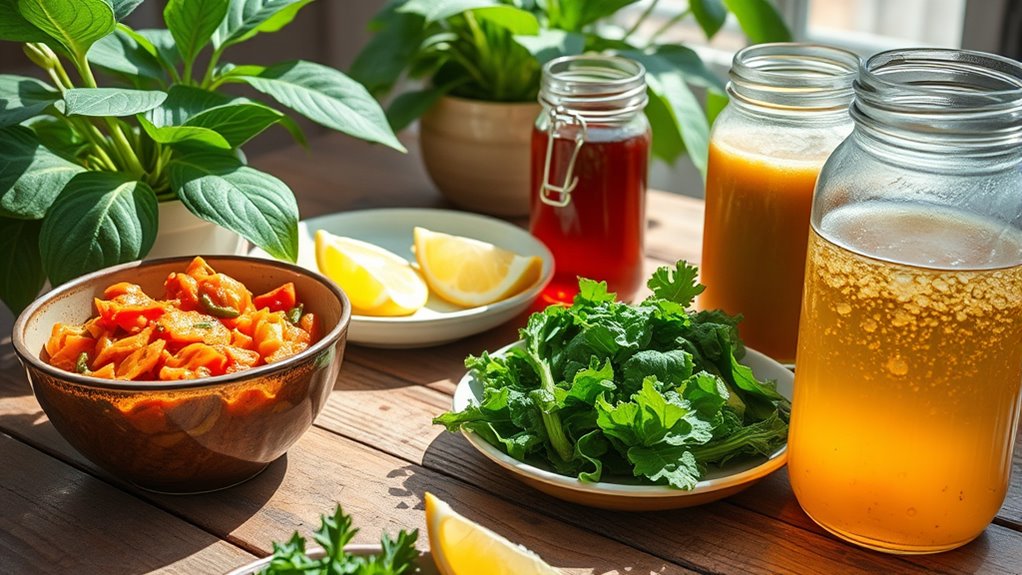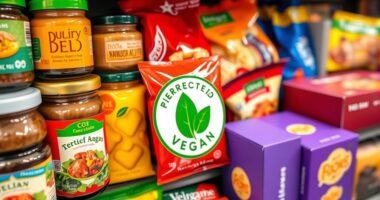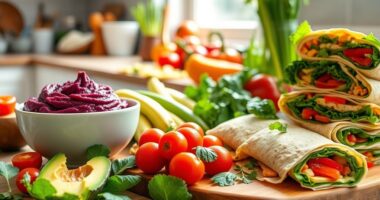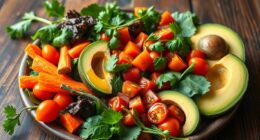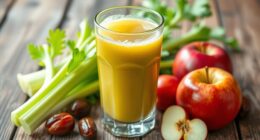Switching to a vegan diet boosts your gut health by increasing fiber intake and adding fermented foods, which help grow a diverse and strong microbiome. The variety of fibers from fruits, vegetables, grains, and legumes supports different beneficial bacteria, while fermented foods like kimchi and sauerkraut introduce helpful probiotics. This combination strengthens your gut barrier, improves digestion, and reduces inflammation. Keep exploring to discover simple ways to optimize your gut health naturally.
Key Takeaways
- Vegan diets rich in diverse fibers promote microbiome diversity and resilience, supporting overall gut health.
- Fermented foods like kimchi and sauerkraut introduce beneficial probiotics that enhance gut bacteria balance.
- A variety of fibers from plant foods nourish different bacterial strains, strengthening the gut barrier and improving digestion.
- Combining fermented foods with high-fiber plant options boosts beneficial microbial growth and nutrient absorption.
- Regular intake of fiber and fermented foods in vegan diets reduces inflammation and promotes a healthy, functioning gut.
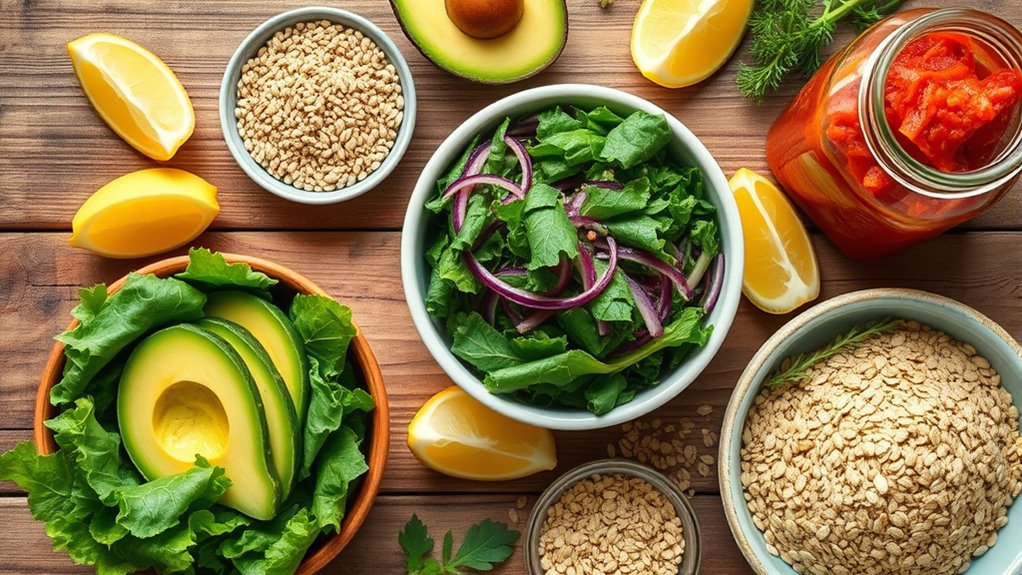
Veganism can considerably influence your gut health, as plant-based diets are rich in fiber and nutrients that support a diverse and balanced microbiome. One of the key benefits of adopting a vegan lifestyle is the increased intake of plant-based probiotics and fiber diversity, which play essential roles in maintaining gut harmony. Plant-based probiotics are naturally occurring microorganisms found in fermented foods like sauerkraut, kimchi, and tempeh, which you can include in your diet to boost beneficial bacteria in your digestive system. These probiotics help strengthen your gut barrier, improve digestion, and reduce inflammation, contributing to overall gut resilience.
Vegan diets boost gut health by increasing fiber and beneficial probiotics.
Fiber diversity is another fundamental component of a vegan diet. Unlike animal-based diets, which often lack sufficient fiber, plant-based foods provide a wide range of fibers that serve as food for your microbiome. Different types of fiber—soluble, insoluble, and prebiotic fibers—each support various bacterial strains, promoting a more resilient and diverse microbiome. This diversity is essential because it enhances your gut’s ability to process different foods, fend off pathogens, and produce essential nutrients like short-chain fatty acids, which nourish your colon lining and reduce inflammation.
By focusing on high-fiber plant foods such as legumes, whole grains, fruits, vegetables, nuts, and seeds, you give your gut bacteria the variety they need to thrive. The more diverse your fiber sources, the more varied the microbial community becomes, which is linked to better immune function and reduced risk of chronic illnesses like obesity and type 2 diabetes. Incorporating fermented plant foods further enriches your microbiome with beneficial microorganisms, creating a symbiotic relationship that enhances digestion and nutrient absorption.
You should aim to include a mix of fermented foods and high-fiber plant options daily. For example, add a serving of kimchi or sauerkraut to your meals, alongside a hearty bowl of lentils or quinoa. This combination not only introduces beneficial bacteria directly but also feeds your existing gut microbiota, encouraging their growth and diversity. As your microbiome becomes more robust and varied, you’ll notice improvements in digestion, reduced bloating, and better overall gut comfort.
Frequently Asked Questions
Can Vegan Diets Cause Nutrient Deficiencies Affecting Gut Health?
Yes, a vegan diet can cause nutrient deficiencies that affect your gut health if not carefully planned. Missing key nutrients like vitamin B12, iron, and omega-3s can lead to gut issues and overall health problems. To prevent this, include fortified foods, supplements, and diverse plant-based options rich in fiber and fermented foods. This approach helps support your gut microbiome and maintain ideal gut health on a vegan diet.
Are All Fermented Foods Suitable for Vegans?
Did you know that over 80% of fermented foods are vegan-friendly? Not all fermented foods are appropriate for vegans, as some involve animal products like dairy or fish. However, fermented plant foods such as sauerkraut, kimchi, and tempeh are rich in vegan-friendly probiotics. Always check labels or recipes to confirm they contain no animal-derived ingredients, so you can confidently enjoy gut-boosting fermented foods on your vegan journey.
How Quickly Can Gut Health Improve on a Vegan Diet?
Your gut microbiome can start improving within a few days of switching to a vegan diet, but noticeable changes often take a few weeks. During this diet shift, increased fiber and fermented foods boost beneficial bacteria, promoting gut health. Stay consistent, eat a variety of plant-based foods, and give your body time to adapt. With patience, you’ll likely see positive shifts in digestion, energy, and overall gut well-being.
Do Vegan Supplements Support Gut Microbiome Diversity?
Yes, vegan supplements can support your gut microbiome diversity. Look for products containing prebiotic fibers, which nourish beneficial bacteria, and plant-based probiotics, which introduce helpful microbes. These supplements help balance your gut flora, enhance digestion, and boost overall health. Incorporating them into your diet can accelerate improvements in gut health, especially when combined with a fiber-rich, plant-based diet.
Is It Necessary to Take Probiotics on a Vegan Diet?
You don’t always need to take probiotics on a vegan diet, but they can be beneficial. Did you know that some probiotic strains can increase gut flora diversity by up to 30%? If your diet lacks fermented foods or fiber, supplements might help restore balance. Consider adding probiotics with well-researched strains like Lactobacillus and Bifidobacterium to support your gut health effectively.
Conclusion
By embracing a vegan diet rich in fiber and fermented foods, you nourish your gut and boost your overall well-being. Imagine your digestive system as a thriving garden, where healthy bacteria flourish and keep everything balanced. Isn’t it worth nurturing this vibrant ecosystem daily? When you prioritize gut health, you’re not just eating for today—you’re cultivating a foundation for a healthier, happier you. So, why not start today and watch your gut bloom?

